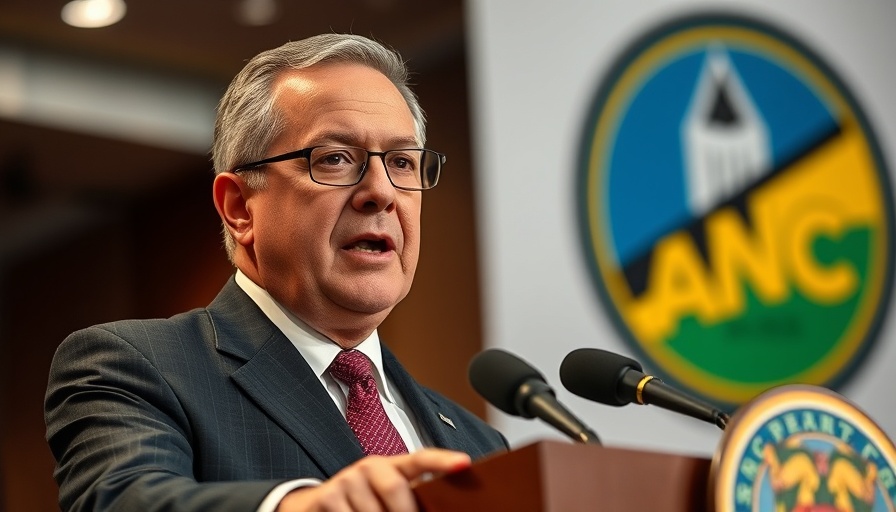
Shift in Power Dynamics: What the ANC's NEC Changes Mean for South Africa
In a reshuffling echoing both urgency and strategy, members of the African National Congress (ANC) National Executive Committee (NEC) have recently been removed from their roles as convenors in various provinces. This move, which comes just ahead of the 2024 national elections, suggests a recalibration of the ANC's approach to governance and provincial management. As the political landscape continues to shift, the ANC's decisions hold significant implications not only for the party itself but for the broader context of South African politics.
A Contextual Overview: The Role of the NEC
The NEC is the highest decision-making body within the ANC between national conferences, wielding significant influence over party politics and government direction. As outlined in ANC’s constitution, the NEC's authority encompasses guiding directives to provincial structures, thereby shaping local governance and political strategies that directly impact voters' lives.
Given its pivotal role, the recent changes in its membership as convenors are indicative of deeper issues within the ANC. Factors such as suboptimal service delivery and growing public discontent with ANC-led policies have necessitated a strong leadership response. By realigning its top tier, the party aims to project a renewed commitment to effective governance and to restore trust ahead of critical elections.
Implications for Upcoming National Elections
As the ANC prepares for the 2024 national elections, these organizational shifts could redefine party strategy. With rising competition from the Democratic Alliance (DA) and the Economic Freedom Fighters (EFF), there is an urgent need for the ANC to reinstate public confidence. The removal of certain NEC members from their provincial convenorships may indicate a clear signal to improve political responsiveness and align closer with constituents' needs.
The effectiveness of these changes will be closely monitored, particularly in the context of ongoing national issues such as economic recovery post-COVID-19, the Eskom crisis leading to persistent load shedding, and high unemployment rates among youth. Voter sentiment is increasingly tied to how well the state can address these pressing challenges.
The Bigger Picture: National Policies and Local Consequences
Current government policies—particularly surrounding land reform, public service delivery, and the management of state-owned enterprises—remain hotly debated topics among South Africans. Historical contexts also show that changes within leadership can signal both a response to public dissatisfaction and an opportunity for new policy directions that might better align with the needs of varied demographics.
The NEC’s strategic realignment potentially plays into broader narratives of accountability within South African politics, with service delivery protests being common indicators of discontent across numerous provinces. Analysts suggest that any perceived ineffectiveness by the ANC can be detrimental to its electoral prospects, especially if these social grievances spill over into organized activism.
Future Predictions: Political Landscape Shifts
Looking forward, there are predictions of significant electoral volatility. The ANC’s reliance on traditional support bases could be tested in light of increasing support for the DA and the EFF, especially among younger voters disillusioned by unmet promises. The effects of state capture allegations and corruption investigations also loom large over the party's reputation, potentially impacting its ability to regain lost ground in key provinces.
As the political terrain shifts, it is critical for the ANC to navigate these changes thoughtfully. The efficacy of its newly deployed NEC members will ultimately determine whether the party can mobilize its base and introduce reforms that resonate with the electorate's urgent demands. It’s a vital period for South Africa’s political future, and the ANC must tread carefully if it wishes to emerge as a credible player on the national stage.
Contextual Relevance: Public Sentiment and the Path Forward
The reshuffle of NEC members could either be seen as pragmatic leadership or as a desperate attempt to salvage the party’s waning popularity. The older generation must recognize the mounting pressures for change, especially as global and local challenges—such as climate change, rising economic inequalities, and public health crises—demand innovative solutions.
As South Africa gears up for an important electoral cycle, understanding these internal party dynamics and their broader implications can provide invaluable insights into the country’s democratic health. Politicians, analysts, and citizens alike will eagerly watch how these changes affect policy implementation and the ANC’s engagement with pressing socio-economic issues.
This article ultimately underscores the importance of transparency and accountability in governance, as well as the necessity for political entities to remain attuned to the needs and expectations of the populace they serve.
As South Africans gear up for a new political landscape, they are encouraged to participate actively in the electoral process, staying informed and demanding accountability from their leaders for the future they wish to see.
 Add Row
Add Row  Add
Add 




Write A Comment